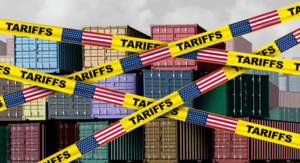
The Rise of the Finternet
Finternet is revolutionizing how we handle our finances in the digital age. Combining the convenience of the internet with financial services, Finternet offers seamless online banking, real-time investment tracking, and personalized financial advice at your fingertips. Say goodbye to long bank queues and complex financial jargon; with Finternet, managing your money is intuitive and accessible anytime, anywhere.
It’s not just about transactions but empowering you with the tools and insights to make informed financial decisions. Dive into the future of finance with Finternet, where technology meets financial freedom, making your financial journey smarter and more efficient.
The Finternet
The digital revolution has transformed every aspect of our lives, and the financial sector is no exception. The convergence of finance and the internet, often referred to as the “Finternet,” is reshaping how we manage, invest, and spend our money.
This article explores seven key points that illustrate the rise of the Finternet and its implications for individuals, businesses, and the global economy.
Read More: 20 Exciting Business Ideas For Teens
Table of Contents
1. Evolution of Online Banking
Online banking is a key component of the Finternet, providing unparalleled convenience and accessibility. Customers can now manage accounts, transfer funds, and pay bills from their smartphones or computers, eliminating the need to visit physical bank branches. This evolution has significantly improved customer experiences and lowered operational costs for banks.
By 2023, over 76% of Americans utilized online banking services, a notable rise from 52% in 2010. This trend highlights the growing reliance on digital solutions in financial management, demonstrating the transformative impact of technology on traditional banking practices and the financial sector as a whole.
Read More: 5 Steps To Making Financial Projections
2. Emergence of Digital Wallets
Digital wallets like PayPal, Apple Pay, and Google Wallet have transformed transaction methods. By securely storing payment information, they enable users to make purchases effortlessly with a tap or click. Their integration with e-commerce sites and mobile apps has simplified the payment process even further.
For instance, PayPal, with its 429 million active accounts reported in Q4 2022, exemplifies the widespread adoption and consumer trust in digital wallets. This evolution in financial technology underscores the convenience and security that digital wallets bring, revolutionizing how we manage and execute transactions in our increasingly digital world.
Read More: Market Analysis: Just In 6 Steps to Conduct One
3. Rise of Cryptocurrency and Blockchain
Cryptocurrency and blockchain technology are key components of the Finternet, driving significant transformation. Cryptocurrencies such as Bitcoin and Ethereum enable decentralized, borderless, and secure transactions.
Blockchain technology, which underpins these currencies, guarantees transparency and security via its distributed ledger system. In 2021, Bitcoin’s market capitalization exceeded $1 trillion, highlighting its increasing acceptance as a legitimate asset class.
This technology not only revolutionizes financial transactions but also offers robust security and transparency, making it a cornerstone of the modern financial landscape. The rise of these digital assets signifies a shift towards a more decentralized and secure financial ecosystem.
Read More: Types of Business Structure
4. Proliferation of Fintech Startups
Fintech startups are leading the charge in the Finternet revolution, introducing cutting-edge solutions that disrupt conventional banking. By harnessing technology, they deliver services like peer-to-peer lending, robo-advisory, and digital insurance.
Their nimble operations and focus on customer needs have drawn substantial investments and a burgeoning user base. The fintech sector’s impressive expansion is underscored by the global fintech investment hitting $210 billion in 2022, reflecting both the industry’s swift growth and investor trust.
These startups are redefining financial services, offering more accessible, efficient, and personalized options, ultimately transforming how we manage and interact with our finances.
Read More: Top 22 Ways To Make Money Online
5. Impact on Traditional Financial Institutions
The emergence of the Finternet has compelled traditional financial institutions to innovate to avoid becoming outdated. Banks and financial entities are investing significantly in digital transformation to maintain their competitiveness.
Efforts include using artificial intelligence for personalized services, strengthening cybersecurity, and creating their own fintech solutions. For instance, in 2021, JPMorgan Chase allocated over $12 billion towards technology, emphasizing digital banking and fintech partnerships.
These initiatives reflect the urgent need for established financial organizations to evolve, integrating advanced technologies to meet the demands of a digital-first customer base and stay relevant in the rapidly changing financial landscape.
6. Regulatory Challenges and Opportunities
The rapid growth of the Finternet has created major regulatory challenges. Governments and regulatory bodies are struggling to effectively oversee digital financial services. Balancing innovation with consumer protection and financial stability requires careful consideration and collaboration between regulators and industry stakeholders.
The European Union’s General Data Protection Regulation (GDPR) and the proposed Digital Operational Resilience Act (DORA) aim to enhance security and resilience in the financial sector.
7. Financial Inclusion and Accessibility
The Finternet significantly boosts financial inclusion, especially for underserved populations, by offering digital banking, credit, and investment opportunities. This enhancement can reduce poverty and spur economic growth in developing areas. Mobile money services, such as M-Pesa in Kenya, exemplify this transformation by providing millions with access to financial services through their mobile phones.
These services facilitate transactions, savings, and microloans, revolutionizing financial accessibility and enabling economic empowerment. As a result, the Finternet not only modernizes finance but also plays a crucial role in fostering global economic development and bridging the financial gap for those previously excluded from traditional banking systems.
Read More: 5 Common Financial Mistakes in Small Business You Must Avoid
Bottom Line
The rise of the Finternet is transforming the financial landscape in ways that were unimaginable just a few decades ago. From the convenience of online banking to the disruptive potential of cryptocurrencies, the Finternet is reshaping how we interact with money. Fintech startups are driving innovation, while traditional financial institutions are adapting to stay relevant.
Regulatory frameworks are evolving to keep pace with technological advancements, ensuring consumer protection and financial stability. Most importantly, the Finternet holds the promise of greater financial inclusion, offering new opportunities for economic empowerment across the globe. As we continue to navigate this digital revolution, understanding and embracing the Finternet will be crucial for individuals, businesses, and policymakers alike.





